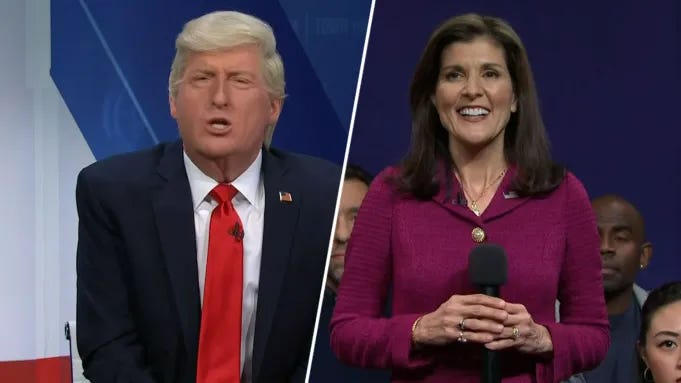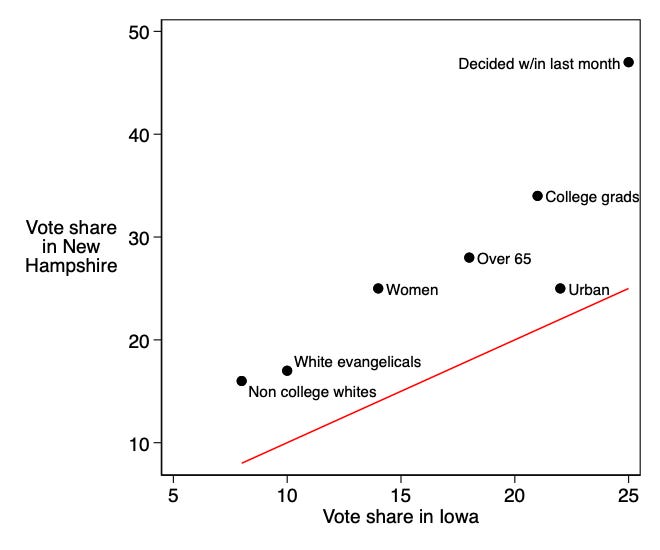Nikki Haley either exceeded expectations or fell just short of them in New Hampshire, depending on your point of view. But despite quite a few pundits saying the nomination contest is essentially over, and despite some of her opponent’s fans threatening her life, she’s staying in it for now. Just what is she hoping to do at this point?
My own view is that Haley’s chances of becoming the Republican presidential nominee, while extremely small, are not zero. (And I’m guessing that’s roughly what her campaign is thinking.) For one thing, there’s her impressive improvement between the Iowa caucuses and the New Hampshire primary.
The data in the figure below come from CNN exit polls in Iowa and New Hampshire, showing Haley’s level of support among various subgroups of caucus-goers and primary voters. Importantly, I have limited these just to self-identified Republicans, so the fact that New Hampshire allows unaffiliated voters to participate in the primary isn’t really relevant. The red line is the Iowa caucuses — any dot above that line means Haley did better in New Hampshire.
What this shows is that Haley did quite a bit better among self-identified New Hampshire Republicans than she did among Iowa Republicans in most of these subgroups, by 5-10 points. She only did slightly better among urbanites — that was one area where she was already doing very well in Iowa. But she did especially well among late deciders, winning around 25% of them in Iowa and nearly 50% in New Hampshire.
What does this mean? For one thing, it shows that Haley has been very successful in consolidating the non-Trump portion of the party. That all happened without an explicit endorsement from Chris Christie or anyone else in the non-Trump faction. For another, in the wake of Iowa, Ron DeSantis and Vivek Ramaswamy dropped out, and the bulk of their support likely went to Trump, but not all of it. Haley likely picked some of that up. No, she’s still not over 50% in these categories, but she’s at least moving in the right direction.
Another reason for her to stay in the race is the same reason she and other candidates entered it in the first place: there are still a number of things that could take Trump out of contention, and he is in a precarious situation. The Supreme Court is soon going to rule whether Trump can appear on Colorado’s ballot. If they rule, say, that this is a matter left up to the states, we’ll likely see at least a handful of other states disqualify him. This not only would complicate his path to the nomination, but would give Haley an excellent argument for being the one Republican candidate left who can run in all 50 states.
Also, he may well be convicted of a felony in the next few months, although likely not soon enough to affect the nomination contest (and it might not have affected that contest anyway). Also, not for nothing, but a court recently fined Trump $83.3 million for defaming a woman he raped.
Now, none of these seems about to turn the tide against Trump, but should Trump end up either needing to drop out or being disqualified, a number of candidates who have suspended their campaigns would likely jump back in, especially DeSantis. Haley still wouldn’t have an easy path to the nomination, but as the one candidate with an active operation across the country and the most delegates at that point, she’d have a significant jump on her competitors.
Again, Haley still faces very long odds at this point, but her donors still seem willing to back her, at least until South Carolina. And she probably figures she’s not doing herself any harm, and may be doing herself some significant good, by staying in the race.







And what’s the possibility Haley is also auditioning for Vice President? Even with all the acrimony, I wouldn’t put it past Trump to choose her and her to accept--both being chameleon opportunists. Combining forces, they would pose an even more formidable challenge to Biden maybe?